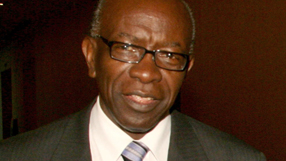Warner losing grip on CONCACAF
MIAMI - FIFA vice-president Jack Warner finds himself suspended from office, his supporters turning against him and his confederation dragged into a corruption row that has set world football's leaders against each other - all less than a month after being re-elected president of CONCACAF.

For once, a region which has not produced a World Cup semi-finalist in the past 80 years, now finds itself at the heart of the game's affairs - but for all the wrong reasons.
The Gold Cup, the continental championship for CONCACAF's North and Central America and Caribbean, begins on Sunday in Dallas with Trinidadian Warner, who has been at the organisation's helm for over 20 years, 'barred from all football activities' pending an investigation into bribery allegations.
Vice-president Lisle Austin of Barbados is temporarily at the head of the federation while the process plays out but it remains to be seen if he will look to replace Warner, who was re-elected unanimously, on a permanent basis.
The suspension, handed down by FIFA's Ethics Committee on Sunday, relates to allegations that were reported to FIFA by CONCACAF's American general secretary Chuck Blazer.
When CONCACAF re-elected Warner at its congress on May 3 - the alliance between the bearded Blazer from New York and Trinidadian Warner looked, on the surface to be strong.
But behind the scenes, Warner, who like Blazer was a long-standing ally of FIFA president Sepp Blatter, was planning a meeting with Qatari Mohammed Bin Hammam. It was a get-together where, Blazer alleges, bribes were handed out.
The charges have been denied by Warner and Bin Hammam but some Caribbean federations, including Puerto Rico's, have backed up the claims according to FIFA.
Get FourFourTwo Newsletter
The best features, fun and footballing quizzes, straight to your inbox every week.
Warner says he has statements from 13 Caribbean federations backing him. But that presumably leaves 12 that no longer are willing to give him their support, a near halving of his power base.
With little hard support for Warner in Central and North America, his majority has dissipated and it is hard to see how he could come back to power.
Warner has based his power on the Caribbean Football Union's 25 votes - allied with Blazer's diplomatic skills at keeping the United States and Mexico on board.
Now that the relationship between Blazer and Warner has been broken and Warner has lost his monolithic vote block in the Caribbean, all bets are off.
Mexico, the most successful football nation in the region, has long been uncomfortable with CONCACAF politics and while rumours of them splitting away to join South America's CONMEBOL are almost certainly fanciful, they may decide that now is the time to lead the Spanish-speaking countries, into a stronger role.
The United States are growing as an economic power in the sport and while they have been close allies of Warner's - through Blazer - they too may feel this is the right moment to use their financial weight and take on a leadership role.
But the numbers - 25 out of 35 full FIFA members from the region - remain with the Caribbean and it is there that the short-term future direction of the confederation will be decided.
Will the Warner loyalists look to re-establish their power or will the rebels, who have provided evidence against him, be joined by more defectors in th
